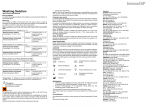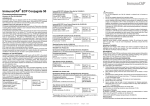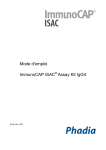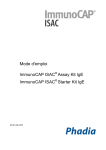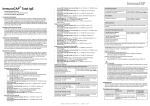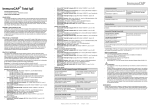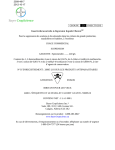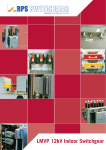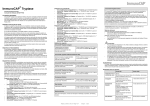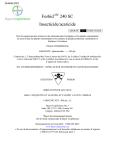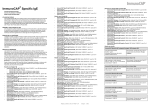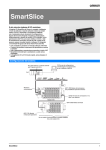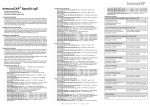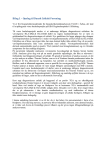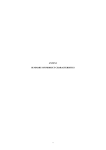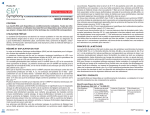Download ImmunoCAP Specific IgG4
Transcript
® ImmunoCAP Specific IgG4 ImmunoCAP Specific IgG4 Calibrators (Art No 10-9466-01) (For one calibration curve) Fluoroenzymeimmunoassay Specific IgG4 Calibrators (Cal-xx) (human IgG4 in buffer) Conc. 0, 3, 15, 35, 120 and 300 µg/l Preservative* <0.003% ; 0.2 ml Directions for Use 52-5259-EN/08 INTENDED USE ImmunoCAP Specific IgG4 is an in vitro test system for the quantitative measurement of antigen specific IgG4 antibodies in human serum and plasma. ImmunoCAP Specific IgG4 assay is to be used with the instrument Phadia 100. It is intended for in vitro diagnostic use in conjunction with other clinical findings, and is to be used in clinical laboratories, as well as physician office laboratories. SUMMARY AND EXPLANATION OF THE TEST The measurements of specific IgG and/or IgG4 antibodies have been used in clinical studies of different allergic diseases such as asthma, rhinitis, urticaria, eczema and gastrointestinal disorders but also in different lung diseases, e.g. allergic alveolitis, aspergilloma and aspergillosis (1-12). In monitoring immunotherapy with inhalants and hymenoptera venoms increased levels of specific IgG and/or IgG4 are generally seen, but a definitive correlation with the clinical outcome has not been shown (1-7). In some studies antigen specific IgG4 antibodies have been measured in patients with food allergy or intolerance (8). It is generally believed that specific IgG and IgG4 antibodies are biomarkers of antigen exposure (9-10). Allergen specific IgG4 antibodies may also have a role in immune deviation and development of tolerance (1, 3, 11-12). However, the exact role of specific IgG and IgG4 antibody measurements in clinical routine investigations has not yet been established. PRINCIPLE OF THE PROCEDURE The antigen of interest, covalently coupled to ImmunoCAP, reacts with the specific IgG4 antibodies in the diluted patient sample. After washing away non-specific IgG4, enzyme labeled antibodies against IgG4 are added to form a complex. After incubation, unbound enzyme-anti-IgG4 is washed away and the bound complex is then incubated with a developing agent. After stopping the reaction, the fluorescence of the eluate is measured. The higher the response value, the more specific IgG4 antibodies are present in the sample. To evaluate the test results, the response for the patient samples are transformed to concentrations with the use of a calibration curve. REAGENTS Reagents are packaged in separate units, each purchased separately. The two digit suffix (-01) on the article number may vary between countries. The expiration date and storage temperature for each of the units are stated on the outer label. However, each component is stable until the date stated on each individual component's label. Note! It is not recommended to pool any reagents. 1 vial Ready for use Store at 2-8 °C until expiration date Do not freeze! ImmunoCAP Specific IgA/IgG Sample Diluent (Art No 10-9498-01) Specific IgA/IgG Sample Diluent (buffer solution with chicken serum) Preservative* <0.003%; 10 ml 6 vials Ready for use Store at 2-8 °C until expiration date Ready for use Store at 2-8 °C until expiration date • • ImmunoCAP IgA/IgG Calibrator ImmunoCAP (Art No 14-4424-01) IgA/IgG Calibrator ImmunoCAP (AGcal) (mouse monoclonal antibodies) Preservative* <0.003% 1 carrier of 16 Ready for use ImmunoCAP Store at 2-8 °C until expiration date ImmunoCAP Specific IgG4 Curve Controls (Art No 10-9467-01) (For 3 runs) Handling of ImmunoCAP Carrier Keep the carrier closed to avoid evaporation of buffer. Do not leave the carrier open for more than 1 day at room temperature, otherwise, discard the first ImmunoCAP. Indication of instability Phadia 100 software has built-in acceptance limits for the calibration curve and the curve controls. For more information see Phadia 100 User Manual. Specific IgG4 Curve Control 1 (CC-1) 3 single (human IgG4 in buffer) dose vials Preservative* <0.003% ; 0.2 ml Ready for use Store at 2-8 °C until expiration date INSTRUMENTS Phadia 100 with built-in software processes all steps of the assay and prints results automatically after the assay is completed. For further information regarding assay setup, instrumentation and software etc. see Phadia 100 User Manual. Specific IgG4 Curve Control 2 (CC-2) 3 single (human IgG4 in buffer) dose vials Preservative* <0.003% ; 0.2 ml Ready for use Store at 2-8 °C until expiration date SPECIMEN COLLECTION AND PREPARATION Collect serum or plasma samples using standard procedures. Keep specimens at room temperature (RT) for shipping purposes only. Store at 2 °C to 8 °C for up to one week, or else at -20 °C. Avoid repeated freezing and thawing. For information on interfering substances, see references (13,14). ImmunoCAP Antigen (See Product Catalogue) ImmunoCAP Antigen are available as individual antigens covalently coupled to the cellulose solid phase. For handling, see below. Preparation of Samples Before assaying all samples have to be diluted 1:100 with ImmunoCAP Specific IgA/IgG Sample Diluent. The dilution step can be done manually or automatically by Phadia 100. (Manually: For example 10 µl sample + 990 µl sample diluent). This dilution is stable 1 week at 2 °C to 8 °C. If the concentration of specific IgG4 antibodies in the sample is >30 mgA/l the sample can be further diluted. Development Solution (Art No 10-9478-01) (Reagents for 600 determinations) PROCEDURES For more information see Phadia 100 User Manual. ImmunoCAP Antigen Preservative* <0.003% Development Solution 4-Methylumbelliferyl-ß-D-galactoside 0.01% Preservative* <0.0010%; 6.0 ml Carriers of 16 or 10 ImmunoCAP 6 vials Ready for use Store at 2-8 °C until expiration date Ready for use Store at 2–8 °C until expiration date Do not freeze! Stop Solution (Art No 10-9479-01) (Reagents for 600 determinations) Stop Solution Sodium carbonate 4 %; 65 ml ImmunoCAP Specific IgG4 Conjugate (Art No 10-9465-01) (Fluoroenzymeimmunoassay for 48 determinations) Specific IgG4 Conjugate ß-Galactosidase-anti-IgG4 (mouse monoclonal antibodies) Approximately 1.5 µg/ml Sodium azide 0.06 % Color coded blue; 2.8 ml 6 single dose vials derivatives should be observed. Please refer to Human Health Service (HHS) Publication No. (CDC) 93-8395 or other local/national guidelines on laboratory safety procedures. Reagents containing >0.0015% mixture of 5-chloro-2-methyl-4-isothiazolin3-one [EC no. 247-500-7] and 2-methyl-2H-isothiazol-3-one [EC no. 220-239-6] (3:1) may cause sensitisation by skin contact. Avoid contact with skin. Wear suitable gloves. For more information see Safety Data Sheet. Reagents that contain sodium azide as a preservative must be handled with care. For more information see Safety Data Sheet. 6 bottles Ready for use Store at 2 - 8 °C until expiration date Washing Solution (Art No 10-9422-01/10-9202-01) For information see separate Washing Solution package insert. *Preservative: Mixture of 5-chloro-2-methyl-4-isothiazolin-3-one [EC no. 247-500-7] and 2-methyl-2H-isothiazol-3-one [EC no. 220-239-6] (3:1). • • • Precautions For in vitro diagnostic use. Not for internal or external use in humans or animals. Do not use reagents beyond their expiration dates. This kit contains reagents manufactured from human blood components. The source materials have been tested by immunoassay for hepatitis B surface antigen, for antibodies to HIV1, HIV2 and hepatitis C virus and found to be negative. Nevertheless, all recommended precautions for the handling of blood Published 2011-Jan-28 Page 1(3) Parameters of the procedure Volumes per determination: Calibrator Sample, diluted Conjugate Development Solution Stop Solution 40 µl 40 µl 50 µl 50 µl 600 µl Total time for one assay is 2.5 hours. Incubations are performed at 37 °C by Phadia 100. Procedural steps For more information see Phadia 100 User Manual. Material Materials provided by Phadia AB: See under REAGENTS. Materials required but not provided by Phadia AB: • Measuring cylinder 1000 ml • Purified water Additional products available from Phadia AB: Phadia 100 Instrument (12-3500-01) Phadia Information Data Manager Software Package (12-3801-11) Maintenance Solution Kit (10-9476-01) FluoroC (10-9264-01) Calibration ImmunoCAP Specific IgG4 Calibrators are run in duplicate to obtain a full calibration curve. The curve can be stored. Curve Controls run in single determinations in subsequent assays validate the stored curve. Patient samples are run in single determinations. For more information see Phadia 100 User Manual. Fig. 1 Reference material The IgG4 calibrators are traceable (via an unbroken chain of calibrations) to the International Reference Preparation (IRP) 67/86 for Human Serum Immunoglobulins A, G, and M from World Health Organisation (WHO). The concentration of subclass IgG4 in IRP 67/86 has been established through calibration to WHO IRP67/97 for which IgG subclass concentrations are reported by Klein et al, Clin. Chem. Acta, 150:119-127 (1985). Calibrator Range 0 - 300 µg/l Quality control Record keeping for each assay: It is good laboratory practice to record the lot numbers of the components used, the dates when they were first opened and the remaining volumes. Control Specimens: Good laboratory practice requires that quality control specimens should be included in every run. Any material used should be assayed repeatedly to establish mean values and acceptable ranges. Controls available from Phadia AB for day to day quality control: PERFORMANCE CHARACTERISTICS (a) Precision The following mean coefficients of variation have been obtained when testing representative antigens from 5 antigen groups. Each sample has been assayed in 3 replicates on totally 18 different occasions using the same lot of antigen, performed with 3 Phadia 100 instruments each with a unique conjugate lot and using stored calibration curves. The samples have been diluted by the Phadia 100 instrument. The coefficient of variation (%) for sample dilution is approx. 4% and is included in the coefficients of variation shown below. ImmunoCAP Specific IgG/IgG4 Control L (10-9473-01) ImmunoCAP Specific IgG/IgG4 Gi1 Control H (10-9475-01) CALCULATION OF RESULTS Phadia 100 is programmed to automatically calculate all results. For more information, see Phadia 100 User Manual. Fig. 2 ImmunoCAP Specific IgG4 antibody concentration (mgA/l) ImmunoCAP Specific IgG4 Calibrators are used for determination of total IgG4 and values are expressed in µg/l. In ImmunoCAP Specific IgG4 assay these calibrators are used for determination of specific IgG4 antibodies, and values are expressed in mgA/l, where A represents antigen-specific antibodies. Values above limit of quantitation represent a progressive increase in the concentration of antigen specific IgG4 antibodies. With a sample dilution of 1:100 IgG4 antibody levels up to 30 mgA/l are measured. LIMITATIONS OF THE PROCEDURE A definitive clinical diagnosis should not be based on the results of any single diagnostic method, but should only be made by the physician after all clinical and laboratory findings have been evaluated. ImmunoCAP allergen not provided especially for ImmunoCAP Specific IgG4 should be used for research purpose only and not in diagnostic procedures. ImmunoCAP antigen labeled G or AG are valid for IgG4 antibody measurements as well. Note! Regular ImmunoCAP allergen f2 (milk) gives exceptionally high non-specific binding in ImmunoCAP Specific IgG4 and should not be used in this system. The use of separate milk component ImmunoCAP antigen is recommended instead of f2. Sample level (mgA/l) 0.16 – 0.59 1.63 – 12.2 19.7 Coefficients of variation (%) Within assay Between assay 8.1 6.3 10.0 8.8 10.0 6.9 (a) Sensitivity Limit of quantitation (NCCLS EP17-A) (15) for antigen specific IgG4 antibodies is 0.07 mgA/l. (a) Specificity The crossreactivity of the enzyme-anti-IgG4 with IgG1, IgG2, IgG3, IgA, IgM and IgE is <0.5%. WARRANTY The performance data presented here was obtained using the procedure indicated. Any change or modification in the procedure not recommended by Phadia AB may affect the results, in which event Phadia AB disclaims all warranties expressed, implied or statutory, including the implied warranty of merchantability and fitness for use. Phadia AB and its authorized distributors, in such event, shall not be liable for damages indirect or consequential. Fig. 3-5. EXPECTED VALUES Dogmatic interpretation of specific IgG/IgG4 antibody test results is not possible. In monitoring immunotherapy increased levels of specific IgG/IgG4 are generally seen, but a definitive correlation with the clinical outcome has not been shown (1-7). Examples of results obtained with ImmunoCAP Specific IgG4 when assaying 100 healthy non-allergic blood donors with 10 antigens are shown in fig. 1-2. The results of 5 patients during immunotherapy are shown in fig. 3-5. Published 2011-Jan-28 Page 2(3) SYMBOLS USED Batch Code In Vitro Diagnostic Medical Device The ImmunoCAP brand name has replaced the UniCAP brand name. The Phadia brand name is applied to instrument platforms and related system items. Biological Risks Caution Notes (a) Studies performed at Phadia AB, Uppsala, Sweden. Temperature Limitation Contains Sufficient for <n> Tests The following designations are trademarks belonging to Phadia AB: ImmunoCAP, Phadia. Use By Consult Instructions for Use Addresses AUSTRIA Phadia Austria GmbH Floridsdorfer Hauptstrasse 1 A-1210 Vienna Tel: +43-1 270 2020 Fax: +43-1 270 202020 BELGIUM Phadia NV/SA Rue de la Fusée, 64 BE-1130 BRUSSELS Tel: +32-2 749 55 15 Fax: +32-2 749 55 23 BRAZIL Phadia Diagnósticos Ltda. Rua Luigi Galvani, 70-10° andar - conj. 101 Cidade Monções - São Paulo - SP Cep: 04575-020 Tel: +55-11 3345 5050 Fax: +55-11 3345 5060 CZECH REPUBLIC Phadia s.r.o. Ing. Milan Nemec Hostalkova 48 16900 PRAHA 6 Tel: +420 220 511 392 Fax.: +420 220 511 392 DENMARK Phadia ApS Gydevang 33 DK-3450 ALLERØD Tel: +45-70 23 33 06 Fax: +45-70 23 33 07 FINLAND Phadia Oy Rajatorpantie 41 c FIN-01640 VANTAA Tel: +358-9 8520 2560 Fax: +358-9 8520 2565 FRANCE Phadia S.A.S. BP 610 FR-78056 ST QUENTIN-EN-YVELINES CEDEX Tel: +33-1 61 37 34 30 Fax: +33-1 30 64 62 37 GERMANY Phadia GmbH Postfach 1050 DE-790 10 FREIBURG Tel: +49-761 47 805-0 Fax: +49-761 47805-338 GREAT BRITAIN Phadia Ltd Media House, Presley Way Crownhill, Milton Keynes MK8 0ES UK Tel: +44-1908 84 70 34 Fax: +44-1908 84 75 54 IRELAND Phadia Ltd. (Irish Branch) Beaghbeg, Carrigallen LEITRIM Tel: +44 1908 84 70 34 Fax: +44 1908 84 75 54 ITALY Phadia S.r.l. Via Libero Temolo, 4 IT-201 26 MILANO Tel: +39-0264 163 411 Fax: +39-0264 163 415 JAPAN Phadia K.K. Tokyo Opera City Tower 3-20-2, Nishi-shinjuku, Shinjuku-ku TOKYO JP-163-1431 Tel: +81-3 5365 83 32 Fax: +81-3 5365 83 36 KOREA Phadia Korea Co. LTD., Patents/Trademarks Manufacturer REFERENCES 1. Till SJ, Francis JN, Nouri-Aria K, Durham SR. Mechanisms of immunotherapy. J Allergy Clin Immunol. 2004 Jun;113:1025-34. 2. Schiavino D, Nucera E, Pollastrini E, De Pasquale T, Buonomo A, Bartolozzi F, Lombardo C, Roncallo C, Patriarca G. Specific ultrarush desensitization in Hymenoptera venom-allergic patients.Ann Allergy Asthma Immunol. 2004 Apr;92:409-13. 3. Jutel M, Akdis M, Blaser K, Akdis CA. Are regulatory T cells the target of venom immunotherapy? Curr Opin Allergy Clin Immunol. 2005 Aug;5:365-9. 4. Nagata M, Yamamoto H, Tabe K, Kimura I, Houya I, Kuramitso K, et al. Effect of Rush Immunotherapy in House-Dust-Mite (HDM)-Sensitive Adult Bronchial Asthma: Changes in In-Vivo and In-Vitro Responses to HDM. Intern Med 1993;32(9):702-9. 5. Gehlhar K, Schlaak M, Becker W, Bufe A. Monitoring allergen immunotherapy of pollen-allergic patients: the ratio of allergenspecific IgG4 to IgG1 correlates with clinical outcome. Clin Exp Allergy 1999; 29:497–506. 6. Lima MT, Wilson D, Pitkin L et al. Grass pollen sublingual immunotherapy for seasonal rhinoconjunctivitis: a randomized controlled trial. Clin Exp Allergy 2002; 32:507–14. 7. Ewbank PA, Murray J, Sanders K, Curran-Everett D, Dreskin S, Nelson HS. A double-blind, placebo-controlled immunotherapy dose–response study with standardized cat extract. J Allergy Clin Immunol 2003; 111:155–61. 8. Garcia BE,Sanz ML, Fernández M, Dièguez I, Oehling A. Value of IgG4 antibodies against food in atopic dermatitis. Allergol Immunopathol 1990;18(4):187-90. 9. Tomee JFC, Dubois AEJ, Koëter GH, Beaumont F, van der Werf TS, Kauffman HF. Specific IgG4 Responses during Chronic and Transient Antigen Exposure in Aspergillosis. Am J Respir Crit Care Med 1996;153:1952-7. 10. Homburger HA, Mauer K, Sachs MI, O'Connell EJ, Jacob GL, Caron J. Serum IgG4 concentrations and allergen-specific IgG4 antibodies compared in adults and children with asthma and nonallergic subjects. J Allergy Clin Immunol 1986;77:427-34. 11. Platts-Mills T, Vaughan J, Squillace S, Woodfolk J, Sporik R. Sensitisation, asthma, and a modified Th2 response in children exposed to cat allergen: a population-based cross-sectional study. Lancet 2001; 357:752–6. 12. E. C. Matsui, G. B. Diette, E. J. M. Kropw, R. C. Aalberse, A. L. Smith, J. Curtin-Brosnan P. A. Eggleston. Mouse allergen-specific immunoglobulin G and immunoglobulin G4 and allergic symptoms in immunoglobulin E-sensitized laboratory animal workers. Clin Exp Allergy 2005; 35:1347–1353. 13. Friedman RB, Young DS. Effects of Disease on Clinical Laboratory Tests. Second ed. AACC Press 1989;3-133 - 3-134. 14. Tryding N, Hansson P, Tufvesson C, Sjölin T, Sonntag O, editors. Drug Effects in Clinical Chemistry. Stockholm: Apoteksbolaget, 1992:371. 15. NCCLS. Protocols for Determination of Limits of Detection and Limits of Quantitation; Approved Guideline. NCCLS document EP17-A (ISBN 1-56238-551-8) October 2004. Published 2011-Jan-28 20 Fl, IT Mirea Tower 60-21, Gasan-dong Geumcheon-gu Seoul 153-801 Tel: +82-2-2027-5400 Fax: +82-2-2027-5404 THE NETHERLANDS Phadia B.V. Postbus 696 NL-3430 AR NIEUWEGEIN Tel: +31-30 602 37 00 Fax: +31-30 602 37 09 NORWAY Phadia AS Postboks 4756, Nydalen NO-0421 OSLO Tel: +47-21 67 32 80 Fax: +47-21 67 32 81 PORTUGAL Phadia Sociedade Unipessoal Lda Lagoas Park - Edifício n°11 - Piso 0 PT-2740-270 PORTO SALVO Tel: +351-214 23 53 50 Fax: +351-214 21 60 36 SOUTH AFRICA Laboratory Specialities (PTY) A Phadia Company P.O Box 1259 Ferndale 2160 Tel: +27 11 793 5337 Fax: +27 11 793 1064 SPAIN Phadia Spain SL Ctra. Rubí, 72-74 (Edifício Horizon) ES-08173 SANT CUGAT DEL VALLÉS (BARCELONA) Tel: +34-935 765 800 Fax: +34-935 765 820 SWEDEN Phadia AB, Marknadsbolag Sverige P O Box 6460 SE-751 37 UPPSALA Tel: +46-18 16 50 00 Fax: +46-18 16 63 24 SWITZERLAND Phadia AG Sennweidstrasse 46 CH-6312 STEINHAUSEN Tel: +41-43 343 40 50 Fax: +41-43 343 40 51 TAIWAN Phadia Taiwan Inc. 8F,-1, No. 147, Sec. 2, Jianguo N. Rd. TAIPEI 104 Taiwan R.O.C. Tel: +886-2 2516 0925 Fax: +886-2-2509 9756 USA Phadia US Inc. 4169 Commercial Avenue Portage, Michigan 49002 Tel: +1 800-346-4364 (Toll Free) Fax: +1 269 492-7541 OTHER COUNTRIES Phadia AB, Distributor Sales P O Box 6460, SE-751 37 UPPSALA Tel: +46 18 16 56 16 Fax: +46 18 16 63 65 Issued May 2006. Revised August 2010. © Phadia AB, Uppsala, Sweden. Manufactured by Phadia AB, P O Box 6460, SE-751 37 Uppsala, Sweden Tel: +46 18 16 50 00 Fax: +46 18 14 03 58 Page 3(3)



